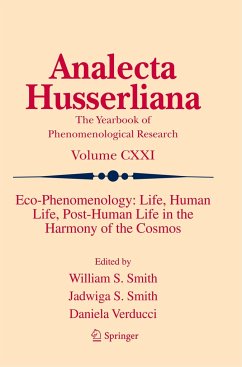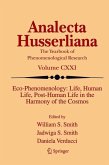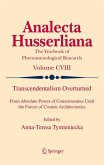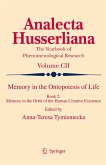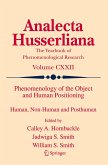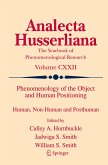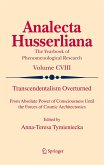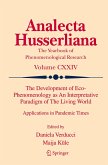Eco-Phenomenology: Life, Human Life, Post-Human Life in the Harmony of the Cosmos
Herausgegeben:Smith, William S.; Smith, Jadwiga S.; Verducci, Daniela
Eco-Phenomenology: Life, Human Life, Post-Human Life in the Harmony of the Cosmos
Herausgegeben:Smith, William S.; Smith, Jadwiga S.; Verducci, Daniela
- Broschiertes Buch
- Merkliste
- Auf die Merkliste
- Bewerten Bewerten
- Teilen
- Produkt teilen
- Produkterinnerung
- Produkterinnerung
This volume presents discussions on a wide range of topics focused on eco-phenomenology and the interdisciplinary investigation of contemporary environmental thought. Starting out with a Tymieniecka Memorial chapter, the book continues with papers on the foundations, theories, readings and philosophical sources of eco-phenomenology. In addition, it examines issues of phenomenological anthropology, ecological perspectives of the human relationship to nature, and phenomenology of the living body and the virtual body. Furthermore, the volume engages in a dialogue with contemporary behavioral…mehr
Andere Kunden interessierten sich auch für
![Eco-Phenomenology: Life, Human Life, Post-Human Life in the Harmony of the Cosmos Eco-Phenomenology: Life, Human Life, Post-Human Life in the Harmony of the Cosmos]() Eco-Phenomenology: Life, Human Life, Post-Human Life in the Harmony of the Cosmos138,99 €
Eco-Phenomenology: Life, Human Life, Post-Human Life in the Harmony of the Cosmos138,99 €![Transcendentalism Overturned Transcendentalism Overturned]() Transcendentalism Overturned162,99 €
Transcendentalism Overturned162,99 €![Memory in the Ontopoiesis of Life, Book Two Memory in the Ontopoiesis of Life, Book Two]() Memory in the Ontopoiesis of Life, Book Two81,99 €
Memory in the Ontopoiesis of Life, Book Two81,99 €![Phenomenology of the Object and Human Positioning Phenomenology of the Object and Human Positioning]() Phenomenology of the Object and Human Positioning89,99 €
Phenomenology of the Object and Human Positioning89,99 €![Phenomenology of the Object and Human Positioning Phenomenology of the Object and Human Positioning]() Phenomenology of the Object and Human Positioning89,99 €
Phenomenology of the Object and Human Positioning89,99 €![Transcendentalism Overturned Transcendentalism Overturned]() Transcendentalism Overturned250,99 €
Transcendentalism Overturned250,99 €![The Development of Eco-Phenomenology as An Interpretative Paradigm of The Living World The Development of Eco-Phenomenology as An Interpretative Paradigm of The Living World]() The Development of Eco-Phenomenology as An Interpretative Paradigm of The Living World81,99 €
The Development of Eco-Phenomenology as An Interpretative Paradigm of The Living World81,99 €-
-
-
This volume presents discussions on a wide range of topics focused on eco-phenomenology and the interdisciplinary investigation of contemporary environmental thought. Starting out with a Tymieniecka Memorial chapter, the book continues with papers on the foundations, theories, readings and philosophical sources of eco-phenomenology. In addition, it examines issues of phenomenological anthropology, ecological perspectives of the human relationship to nature, and phenomenology of the living body and the virtual body. Furthermore, the volume engages in a dialogue with contemporary behavioral sciences on topics such as eco-alienation, sustainability, and the human relationship to the earth in the context of the cosmos.
Produktdetails
- Produktdetails
- Analecta Husserliana 121
- Verlag: Springer / Springer International Publishing / Springer, Berlin
- Artikelnr. des Verlages: 978-3-030-08475-2
- Softcover reprint of the original 1st ed. 2018
- Seitenzahl: 608
- Erscheinungstermin: 26. Januar 2019
- Englisch
- Abmessung: 235mm x 155mm x 33mm
- Gewicht: 920g
- ISBN-13: 9783030084752
- ISBN-10: 3030084752
- Artikelnr.: 56963295
- Herstellerkennzeichnung Die Herstellerinformationen sind derzeit nicht verfügbar.
- Analecta Husserliana 121
- Verlag: Springer / Springer International Publishing / Springer, Berlin
- Artikelnr. des Verlages: 978-3-030-08475-2
- Softcover reprint of the original 1st ed. 2018
- Seitenzahl: 608
- Erscheinungstermin: 26. Januar 2019
- Englisch
- Abmessung: 235mm x 155mm x 33mm
- Gewicht: 920g
- ISBN-13: 9783030084752
- ISBN-10: 3030084752
- Artikelnr.: 56963295
- Herstellerkennzeichnung Die Herstellerinformationen sind derzeit nicht verfügbar.
Doctors William and Jadwiga Smith have worked closely with Dr. Anna-Teresa Tymieniecka since the mid-1980s. They published widely in the Analecta Husserliana and the Phenomenological Inquiry, organized international conferences, and participated in the WPI at all levels. Both William and Jadwiga Smith are sole trustees for the Dr. Anna-Teresa Tymieniecka Houthakker Living Trust, which oversees and supports the WPI. They are currently professors of English at Bridgewater State University, Bridgewater, Massachusetts, USA. Dr. Daniela Verducci, who serves as the Co-President of the WPI, is responsible for the European conferences that the WPI sponsors and supports. She is also a long-time collaborator of Dr. Tymieniecka's, whose work with the Institute began in the 1990s. Dr. Verducci is currently a professor of Moral Philosophy at Macerata University, Italy.
Part I: A-T. Tymieniecka Memorial.- Chapter 1. The Symphony of Sentience, in Cosmos and Life: In Memoriam Anna-Teresa Tymieniecka (Olga Louchakova-Schwartz).- Part II: Introduction to the Topics.- Chapter 2. World Phenomenology Institute's Eco-Phenomenology (Daniela Verducci).- Chapter 3. Metaphysics and Eco-Phenomenology Aiming at Harmony of Human Life with Cosmos (Francesco Totaro).- Chapter 4. Ontopoiesis of Life as Eco-Phenomenology (Carmen Cozma).- Part III: Seeds of Eco-Phenomenology.- Chapter 5. Some Questions about Idealism and Realism in the Structure of Husserlian Phenomenology (Dario Sacchi).- Chapter 6. An Insight into the Foundations of Eco-Phenomenology (Massimo Marassi).- Chapter 7. Eco-Phenomenology: Philosophical Sources and Main Concepts (Maija Kule).- Chapter 8. The Origin Paradox: How Could Life Emerge from Nonlife? (Ion Soteropoulos).- Chapter 9. Cosmic Harmony, Emergence of Life and of Human Consciousness (Mamuka Dolidze).- Chapter 10. The Fundamental Biofriendly Activity of the Universe (Attila Grandpierre).- Part IV: Cosmos, Nature and Culture.- Chapter 11. Welt. At the Origins of Eco-Phenomenology: Heidegger's Concept of "World" in the Work of Anna-Teresa Tymieniecka (Stefano Veluti).- Chapter 12. Logos of Life and Logos of Science. Metaphysical Advice (Gianfranco Bosio).- Part V: Eco-Cosmology.- Chapter 13. Life and Human Life in the System of World Coordinates on the Basis of Extreme Dynamic Equilibriums (Nikolay N. Kozhevnikov and Vera S. Danilova).- Chapter 14. Eco-Phenomenological Vision: Balancing the Harmony of the Earth (Debika Saha).- Chapter 15. On the Two Versions of Phenomenological Transgressions - Anna-Teresa Tymieniecka and Jean Paul Sartre (Piotr Mróz).- Chapter 16. From Anna-Teresa Tymieniecka's Eco-Phenomenology to Paul Ricoeur's Hermeneutics. The Role of the Human Being in the Global Context of Cosmos, Chaos and Evil (Maria Avelina Cecilia Lafuente).- Chapter 17. Ego: The Cross Point of Divine Illumination and Social Reality (Konul Bunyadzade).- Part VI: Eco-Ethics and Environmental Theories.- Chapter 18. Phenomenology as Ecology: Movement from Ego- to Geo- and Eco-Thinking (Ella Buceniece).- Chapter 19. Cultural Sustainability: Reflection Lines for a Human Life in the Harmony of the Cosmos (Alessandra Lucaioli).- Chapter 20. The Geology of Movement. The Earth and the Dynamic of Phenomenalisation in Merleau-Ponty and Patocka (Renato Boccali).- Part VII: Eco-Phenomenological Readings.- Chapter 21. Sowing "A Quilt of Harmony:" An Eco-Phenomenological Reading of Ben Okri's "Lines in Potentis" from Wild (2012) (Rosemary Gray).- Chapter 22. "Song of the Earth": An Eco-Phenomenology (Kimiyo Murata-Soraci).- Chapter 23. Eco-Phenomenology of Scientific Activity as Non-Routinized Routine: Stefan Banach's Café Method of Research and its Contemporary Continuation (Bronislaw Bombala).- Chapter 24. Sartre on Marx and Freud: A Phenomenological Dialectic of Universal Singulars and Singular Universals (Raymond Langley).- Chapter 25. Eco-Phenomenology: The Japan Original Perspective in the Thought of Nishida Kitaro (Valentina Carella).- Chapter 26. "Negative Seeing:" Robert Smithson, Earth Art, and the Eco-Phenomenology of "Mirror Displacements" (Ming-Qian Ma).- Chapter 27. Transcendental Philosophy of Krishnachandra: An Indian Approach to Human Life (Koushik Joardar).- Part VIII: Eco-Phenomenology: Language and Sentience.- Chapter 28. The Language That (In)habits Us (Antonio Dominguez Rey).- Chapter 29. Small Talk with a Grape Vine, Presence and the Sensuous Depth of Being (Lena Hopsch).- Chapter 30. Phenomenological Elucidations Carried out by Constructing a Phenomenological Language (Erkut Sezgin).- Part IX: Human Openness and Post-Human Cosmicity.- Chapter 31. Animal Being Means Desiring: Subjectivity, Singularity, Diversity in the Post-Human Life (Roberto Marchesini).- Chapter 32. Human Condition, Nature, Power and Creativity. Philosophical Anthropology and Eco-Phenomenology in the Context of Biopolitics (Massimo Mezzanzanica).- Chapter 33. Henryk Skolimowski's Eco-Philosophy as a Project of Living Philosophy (Anna Malecka and Katarzyna Stark).- Part X: Ecology of Human Mind and Human Relations.- Chapter 34. Experience of the City: An Eco-Phenomenological Perspective (Velga Vevere).- Chapter 35. Holographic Memory of Life Situation (Salahaddin Khalilov).- Chapter 36. The Chronotopic Content of the Esoterism and the Models of Thought (Sadaqat M. Aliyeva).- Chapter 37. The Phenomenon of Human Intellect and its Place in the Cosmos Through the Vision of Arabic Philosopher Avempace (Pierpaolo Grezzi).- Chapter 38. Eco-Phenomenology of the Human Environment: The Case of Intercultural Dialogue (Angela Ales Bello).- Chapter 39. Digital Reason vs. Modern "Metamorphosis of Man:" From Philosophical Anthropology of Józef Banka and Anna-Teresa Tymieniecka (Jan Szmyd).- Part XI: Flesh, Body, Embodiment / Space and Time.- Chapter 40. From the Archeology of Happenings ... the Matter of Corporeality (Aleksandra Pawliszyn).- Chapter 41. Multi-Layered Time and the Unity of the Unfolding Logos of Life (Kamil Lacina).- Chapter 42. The Question of (Al)Location (Carla Danani).- Part XII: Eco-Aesthetics, Education and Psychology.- Chapter 43. The Concept of Life in Ludwig Binswanger's Phenomenological Psychopathology (Anna Piazza).- Chapter 44. Meaningless Life: The Role of Clinical Phenomenology in Understanding the "Being in the World" of Psychiatric Patients (Giulio Lo Bello).- Chapter 45. Auditory Phenomena and Human Life: Phenomenological Experience (Ineta Kivle).- Chapter 46. Phenomenology of Virtual Body. An Introduction (Roberto Diodato).- Chapter 47. An Ecological Perspective of Helping Relationship (Antonio De Luca).- Chapter 48. Phenomenology after Conceptual Art (Andrew Chesher).
Part I: A-T. Tymieniecka Memorial.- Chapter 1. The Symphony of Sentience, in Cosmos and Life: In Memoriam Anna-Teresa Tymieniecka (Olga Louchakova-Schwartz).- Part II: Introduction to the Topics.- Chapter 2. World Phenomenology Institute's Eco-Phenomenology (Daniela Verducci).- Chapter 3. Metaphysics and Eco-Phenomenology Aiming at Harmony of Human Life with Cosmos (Francesco Totaro).- Chapter 4. Ontopoiesis of Life as Eco-Phenomenology (Carmen Cozma).- Part III: Seeds of Eco-Phenomenology.- Chapter 5. Some Questions about Idealism and Realism in the Structure of Husserlian Phenomenology (Dario Sacchi).- Chapter 6. An Insight into the Foundations of Eco-Phenomenology (Massimo Marassi).- Chapter 7. Eco-Phenomenology: Philosophical Sources and Main Concepts (Maija Kule).- Chapter 8. The Origin Paradox: How Could Life Emerge from Nonlife? (Ion Soteropoulos).- Chapter 9. Cosmic Harmony, Emergence of Life and of Human Consciousness (Mamuka Dolidze).- Chapter 10. The Fundamental Biofriendly Activity of the Universe (Attila Grandpierre).- Part IV: Cosmos, Nature and Culture.- Chapter 11. Welt. At the Origins of Eco-Phenomenology: Heidegger's Concept of "World" in the Work of Anna-Teresa Tymieniecka (Stefano Veluti).- Chapter 12. Logos of Life and Logos of Science. Metaphysical Advice (Gianfranco Bosio).- Part V: Eco-Cosmology.- Chapter 13. Life and Human Life in the System of World Coordinates on the Basis of Extreme Dynamic Equilibriums (Nikolay N. Kozhevnikov and Vera S. Danilova).- Chapter 14. Eco-Phenomenological Vision: Balancing the Harmony of the Earth (Debika Saha).- Chapter 15. On the Two Versions of Phenomenological Transgressions - Anna-Teresa Tymieniecka and Jean Paul Sartre (Piotr Mróz).- Chapter 16. From Anna-Teresa Tymieniecka's Eco-Phenomenology to Paul Ricoeur's Hermeneutics. The Role of the Human Being in the Global Context of Cosmos, Chaos and Evil (Maria Avelina Cecilia Lafuente).- Chapter 17. Ego: The Cross Point of Divine Illumination and Social Reality (Konul Bunyadzade).- Part VI: Eco-Ethics and Environmental Theories.- Chapter 18. Phenomenology as Ecology: Movement from Ego- to Geo- and Eco-Thinking (Ella Buceniece).- Chapter 19. Cultural Sustainability: Reflection Lines for a Human Life in the Harmony of the Cosmos (Alessandra Lucaioli).- Chapter 20. The Geology of Movement. The Earth and the Dynamic of Phenomenalisation in Merleau-Ponty and Patocka (Renato Boccali).- Part VII: Eco-Phenomenological Readings.- Chapter 21. Sowing "A Quilt of Harmony:" An Eco-Phenomenological Reading of Ben Okri's "Lines in Potentis" from Wild (2012) (Rosemary Gray).- Chapter 22. "Song of the Earth": An Eco-Phenomenology (Kimiyo Murata-Soraci).- Chapter 23. Eco-Phenomenology of Scientific Activity as Non-Routinized Routine: Stefan Banach's Café Method of Research and its Contemporary Continuation (Bronislaw Bombala).- Chapter 24. Sartre on Marx and Freud: A Phenomenological Dialectic of Universal Singulars and Singular Universals (Raymond Langley).- Chapter 25. Eco-Phenomenology: The Japan Original Perspective in the Thought of Nishida Kitaro (Valentina Carella).- Chapter 26. "Negative Seeing:" Robert Smithson, Earth Art, and the Eco-Phenomenology of "Mirror Displacements" (Ming-Qian Ma).- Chapter 27. Transcendental Philosophy of Krishnachandra: An Indian Approach to Human Life (Koushik Joardar).- Part VIII: Eco-Phenomenology: Language and Sentience.- Chapter 28. The Language That (In)habits Us (Antonio Dominguez Rey).- Chapter 29. Small Talk with a Grape Vine, Presence and the Sensuous Depth of Being (Lena Hopsch).- Chapter 30. Phenomenological Elucidations Carried out by Constructing a Phenomenological Language (Erkut Sezgin).- Part IX: Human Openness and Post-Human Cosmicity.- Chapter 31. Animal Being Means Desiring: Subjectivity, Singularity, Diversity in the Post-Human Life (Roberto Marchesini).- Chapter 32. Human Condition, Nature, Power and Creativity. Philosophical Anthropology and Eco-Phenomenology in the Context of Biopolitics (Massimo Mezzanzanica).- Chapter 33. Henryk Skolimowski's Eco-Philosophy as a Project of Living Philosophy (Anna Malecka and Katarzyna Stark).- Part X: Ecology of Human Mind and Human Relations.- Chapter 34. Experience of the City: An Eco-Phenomenological Perspective (Velga Vevere).- Chapter 35. Holographic Memory of Life Situation (Salahaddin Khalilov).- Chapter 36. The Chronotopic Content of the Esoterism and the Models of Thought (Sadaqat M. Aliyeva).- Chapter 37. The Phenomenon of Human Intellect and its Place in the Cosmos Through the Vision of Arabic Philosopher Avempace (Pierpaolo Grezzi).- Chapter 38. Eco-Phenomenology of the Human Environment: The Case of Intercultural Dialogue (Angela Ales Bello).- Chapter 39. Digital Reason vs. Modern "Metamorphosis of Man:" From Philosophical Anthropology of Józef Banka and Anna-Teresa Tymieniecka (Jan Szmyd).- Part XI: Flesh, Body, Embodiment / Space and Time.- Chapter 40. From the Archeology of Happenings ... the Matter of Corporeality (Aleksandra Pawliszyn).- Chapter 41. Multi-Layered Time and the Unity of the Unfolding Logos of Life (Kamil Lacina).- Chapter 42. The Question of (Al)Location (Carla Danani).- Part XII: Eco-Aesthetics, Education and Psychology.- Chapter 43. The Concept of Life in Ludwig Binswanger's Phenomenological Psychopathology (Anna Piazza).- Chapter 44. Meaningless Life: The Role of Clinical Phenomenology in Understanding the "Being in the World" of Psychiatric Patients (Giulio Lo Bello).- Chapter 45. Auditory Phenomena and Human Life: Phenomenological Experience (Ineta Kivle).- Chapter 46. Phenomenology of Virtual Body. An Introduction (Roberto Diodato).- Chapter 47. An Ecological Perspective of Helping Relationship (Antonio De Luca).- Chapter 48. Phenomenology after Conceptual Art (Andrew Chesher).

